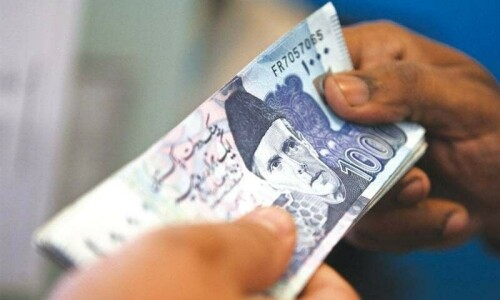FRANKFURT: European Central Bank chief Mario Draghi warned on Thursday that risks to the eurozone economy were “moving to the downside”, acknowledging for the first time that waning global momentum was weighing on the region’s outlook.
But he stressed that the ECB had “not run out of” tools to tackle worsening headwinds, suggesting the bank was in no rush to tighten monetary policy even after it last month ended a major stimulus scheme.
“We have a long list of instruments and we stand ready to use them,” Draghi told reporters in Frankfurt.
Speaking afer the ECB’s first governing council meeting of the year, Draghi said policymakers were unanimous “about acknowledging the weaker momentum and changing the balance of risk for growth”.
In past meetings, the ECB had judged the risks as “broadly balanced”.
But fears of a global downturn have intensified as markets fret over Brexit, stuttering Chinese growth, the fallout from US-led trade tensions and problems in the German car industry.
“The risks surrounding the euro area growth outlook have moved to the downside on account of the persistence of uncertainties related to the geopolitical factors and the threat of protectionism, vulnerabilities in emerging markets and financial market volatility,” Draghi said.
The latest hard and soft economic data have “continued to be weaker than expected,” he added, blaming “softer external demand and some country- and sector-specific factors”.
Eurozone growth slowed to 0.2 per cent in the third quarter of 2018, after an expansion of 0.4pc in the two previous quarters.
Most experts believe the fourth quarter figures will also disappoint.
And data for early 2019 are troubling observers too, with a January purchasing managers’ index (PMI) reading falling to 50.7 points — just above the 50-point boundary between economic growth and contraction.
“With today’s meeting, the ECB has joined the crowd of concern,” but “also does not know where the eurozone economy is headed,” ING Diba bank analyst Carsten Brzeski commented.
Policymakers “will try to buy as much time as possible in the coming months” to allow hard-to-read threats like Brexit and trade friction to either blow over or gain definition, he predicted.
The darkening clouds come after the ECB in December ended a massive government and corporate bond-buying scheme that been propping up the eurozone economy.
The easy money scheme saw the Frankfurt institution pump 2.6 trillion euros ($3tr) into the eurozone economy over a nearly four-year period.
Its end marked the removal of a key pillar of support to the economy, with the ECB saying it was confident the region could weather upcoming challenges and that inflation was on track to meet the bank’s goal of just under 2.0pc.
Published in Dawn, January 25th, 2019















































Dear visitor, the comments section is undergoing an overhaul and will return soon.